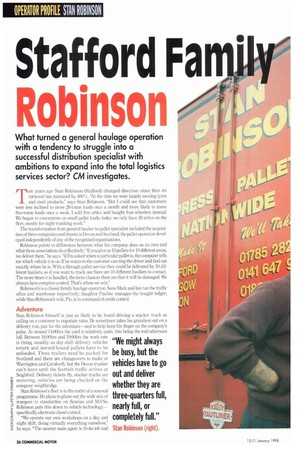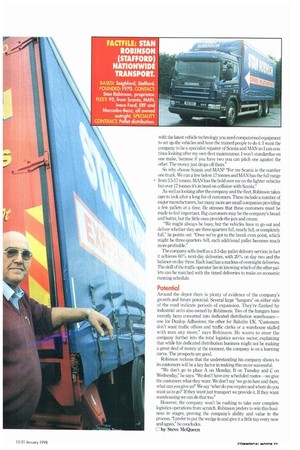OPERATOR PROFILE STAN ROBINSON
Page 48

Page 49

If you've noticed an error in this article please click here to report it so we can fix it.
Stafford Fa Robinson
What turned a general haulage operation with a tendency to struggle into a successful distribution specialist with ambitions to expand into the total logistics services sector? CM investigates. FACTFILE: STAN ROBINSON (STAFFORD) NATIONWIDE TRANSPORT.
BASED: Seighford, Stafford. FOUNDED:1970. CONTACT: Stan Robinson, proprietor. FLEET: 95, from Scania, MAN, Iveco Ford, ERF and Mercedes-Benz, all owned outright. SPECIALITY CONTRACT: Pallet distribution.
Ten years ago Stan Robinson (Stafford) changed direction: since then its turnover has increased by 400%. "At the time we were largely moving tyres and steel products," says Stan Robinson. "But I could see that customers were less inclined to move 20-tonne loads once a month and more likely to move five-tonne loads once a week. I sold five artics and bought four-wheelers instead. We began to concentrate on small pallet loads; today we only have 20 artics on the fleet, mostly for night trunking work."
The transformation from general haulier to pallet specialist included the acquisition of three companies and depots in Devon and Scotland; the pallet operation developed independently of any of the recognised organisations.
Robinson points to differences between what his company does on its own and what those associations do collectively: "If you give us 10 pallets for 10 different areas, we deliver them," he says. "If I'm asked where a particular pallet is, the computer tells me which vehicle it is On. If he wants to the customer can ring the driver and find out exactly where he is. With a through pallet service they could be delivered by 10 different hauliers, so if you want to track one there are 10 different hauliers to contact. The more times it is handled, the more chances there are that it will be damaged. We always have complete control. That's where we win."
Robinson's is a classic family haulage operation. Sons Mark and Ian run the traffic office and warehouse respectively; daughter Pauline manages the bought ledger; while Stan Robinson's wife, Flo, is in command of credit control.
Adventure Stan Robinson himself is just as likely to be found driving a stacker truck as calling on a customer to negotiate rates. He sometimes takes his grandson out on a delivery run, just for the adventure—and to help keep his finger on the company's pulse. At around 14:00hrs the yard is relatively quiet, this being the mid-afternoon lull. Between 16:00hrs and 19:00hrs the work rate is rising steadily as day-shift delivery vehicles We might always return and inward-bound pallets have to be unloaded. Three trailers need be packed for be busy, but the Scotland and there are changeovers to make at Warrington and Uirnforth, but the Devon trunker vehicles have to go can't leave until the Scottish traffic arrives at Seighford. Delivery tickets fly, stacker trucks are out and deliver
cr
W motoring, vehicles are being checked on the m < company weighbridge. a whether they are cc Stan Robinson's fleet is in the midst of a renewal IE: programme. He plans to phase out the wide mix of three-quarters full, 6: marques to standardise on Scanias and MANs. ,.. _. Robinson puts this down to vehicle technology— nearly full, or specifically, electronic diesel control. 8 "We operate our own workshops on a day and completely full." .6 night shift, doing virtually everything ourselves," 1 he says. "The nearest main agent is Stoke-ish and Stan Robinson (right). with the latest vehicle technology you need computerised equipment to set up the vehicles and have the trained people to do it. I want the company to be a specialist repairer of Scania and MAN so I can continue looking after my own fleet maintenance. I won't standardise on one make, because if you have two you can pitch one against the other. The money just drops off them."
So why choose Scania and MAN? "For me Scania is the number one truck. We run a few below 17 tonnes and MAN has the full range from 3.5-17 tonnes. MAN has the hold over me on the lighter vehicles but over 17 tonnes it's in head-on collision with Scania."
As well as looking after the company and the fleet, Robinson takes care to look after a long list of customers. These include a number of major manufacturers, but many more are small companies providing a few pallets at a time. He stresses that these customers must be made to feel important. Big customers may be the company's bread and butter, but the little ones provide the jam and cream.
"We might always be busy, but the vehicles have to go out and deliver whether they are three-quarters full, nearly full, or completely full," he points out. "Once we've got to the break even point, which might be three-quarters full, each additional pallet becomes much more profitable."
The company sells itself as a 2-3-day pallet delivery service; in fact it achieves 60% next-day deliveries, with 20% on day two and the balance on day three. Each load has a nucleus of overnight deliveries. The skill of the traffic operator lies in knowing which of the other pallets can be matched with the timed deliveries to make an economic running schedule.
Potential
Around the depot there is plenty of evidence of the company's growth and future potential. Several large "hangars" on either side of the road indicate periods of expansion. They're flanked by industrial units also owned by Robinson& Two of the hangars have recently been converted into dedicated distribution warehouses— one for Dunlop Adhesives; the other for Bakelite UK. "Customers don't want traffic offices and traffic clerks or a warehouse staffed with men any more," says Robinson. He wants to steer the company further into the total logistics service sector, explaining that while his dedicated distribution business might not be making a great deal of money at the moment, the company is on a learning curve. The prospects are good.
Robinson reckons that the understanding his company shows to its customers will be a key factor in making this move successful.
"We don't go to place A on Monday, B on Tuesday and C on Wednesday," he says. "We don't have any scheduled routes—we give the customers what they want. We don't say 'we go to here and there, what can you give us?' We say 'what do you require and where do you want us to go?' If they want just transport we provide it. If they want warehousing we can do that too."
However, the company won't be rushing to take over complete logistics operations from scratch. Robinson prefers to win this business in stages, proving the company's ability and value in the process. "I prefer to put the wedge in and give it a little tap every now and again," he concludes.
El by Steve McQueen
















































































































